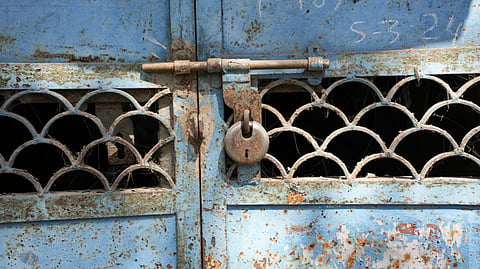

Jalangi in Murshidabad district, West Bengal, was once a thriving hamlet of around 70 households. Today, the village is unrecognisable as a ‘ghost village’ — over 50 houses lie empty. The abrupt cessation of the Mahatma Gandhi National Rural Employment Guarantee Scheme (MGNREGS) has led to a haunting transformation of many such villages in West Bengal.
The scheme’s operations came to a grinding halt in many villages across the state around two years ago. Down To Earth (DTE) visited these areas to see the impact and found that the lack of work opportunities has exacerbated the already challenging economic conditions in these areas, leaving residents grappling with uncertainty and despair.
On December 21, 2021, the central government suddenly invoked Section 27 of Mahatma Gandhi National Rural Employment Guarantee Act and stopped funds for the scheme. It then stopped commissioning work under the Act in 2022. Since then, no labour budget has been approved for West Bengal for 2023-24 and 2024-25 under the scheme.
MGNREGS, a government programme aimed at providing 100 days of guaranteed wage employment to every household in rural India, has long been a lifeline for millions of impoverished families in West Bengal.
Conversations with villagers revealed that inhabitants residing in pukka houses constructed by the state government have also opted to migrate with their families.
These residents make occasional visits once every two to three years, either when necessary or to attend to pending tasks. After staying for a few months or depleting their savings, these families relocate to other states in search of employment opportunities.
The remaining households are inhabited solely by women, children, or the elderly — except a handful, the men have all left in pursuit of employment opportunities.
The remaining households in Jalangi are inhabited solely by women, children, or the elderly — except a handful, the men have all left in pursuit of employment opportunities. Photo: KA Shreya / DTE
“Most people have temporarily returned for the month of Ramadan,” said 31-year-old Susan Mondal, from Bidupur colony.
Mondal stated that not a single household in the colony or neighbouring colonies has men residing in the village and earning a livelihood. “I sustained a leg injury in my previous work as a carpenter, which compelled me to return home for recovery. Otherwise, I wouldn’t have chosen to stay here without any work at hand,” he added.
All those who can work migrate to states such as Kerala, Tamil Nadu, Maharashtra, Goa, Rajasthan and Delhi, Mondal said. The villagers take odd jobs at construction sites, brick kilns, farm labourers, cab drivers and others.
“We go wherever there is work. When approached by a contractor with an offer, we weigh our options and choose the most viable opportunity before relocating,” he said.
The impact of the stoppage of MGNREGS is particularly pronounced in the village; there are no work opportunities in the region due to poor industrial and economic development. Without supplementary income from the scheme, those who used to work on farms were faced with a bleak future.
“Earlier, we used to work on farms to cultivate wheat, sesame and mustard. When it was not farming season, we sought employment under MGNREGS,” said Nazimuddin Mondal (50).
But workers across Murshidabad district have not received payments over the past five years, said Nazimuddin . “Payment for the entire state ceased as of December 2021, and work allocation was halted by the Centre starting from March 2022,” he said. Working as an agricultural labourer was insufficient due to meagre yields and low wages.
“Before the cessation of MGNREGS work, labourers could rely on a stable income, as they could work for 100 days and earn approximately Rs 200 per day. However, following the halt in work, labourers now struggle to secure employment that pays Rs 250-300 per day, albeit only once a week, or sometimes they must wait for up to a fortnight for such opportunities,” he said.
DTE visits across other villages and neighbourhoods revealed a similar situation.
In Sarkarpura village in the state, approximately 90 percent of the total 1,200 residents have left, said villager Salim Shaikh (32). “Working in Kerala or Delhi pays us Rs 700-800 a day, which is sufficient to sustain ourselves and our families, as the contractor or employer covers living expenses. We can save at least Rs 200 daily,” he said.
Constantly on the move for work, these families lack a permanent home, such as the one in their villages. “We have to relocate across states wherever work opportunities arise. But that’s the only option for earning a living. How can we survive without work and income?” he questioned.